
Related
Topics
Guests
- Anya Bernsteinassociate professor at the SUNY Buffalo Law School and author of “The Hidden Costs of Terrorist Watch Lists,” published by the Buffalo Law Review.
With hundreds of thousands of people now on the government’s terrorist watch lists, a closely watched trial begins today in San Francisco. Stanford University Ph.D. student Rahinah Ibrahim is suing the U.S. government after she was barred from flying from Malaysia back to the United States in 2005 to complete her studies at Stanford after her name was placed on the list. The New York Times reports that the federal government’s terrorist watch list, officially called the “Terrorist Screening Database,” has grown to at least 700,000 people, and those on the list are often subjected to extra scrutiny, prohibited from flying, and interrogated while attempting to cross borders. The government refuses to divulge who is on the list, how one can get off the list, and what criteria is used to place someone on the list in the first place. Oftentimes, people have no idea their name is in the database until they attempt to board a flight. We speak with Anya Bernstein, associate professor at the SUNY Buffalo Law School and author of the article, “The Hidden Costs of Terrorist Watch Lists.”
Transcript
AMY GOODMAN: Thanksgiving is one of the nation’s busiest travel days. This year, hundreds of thousands of people may have been in for a rude awakening when they tried to board their flights. The New York Times reports the federal government’s terrorist watch list, officially called the “Terrorist Screening Database,” has grown to at least 700,000 people, and those on the list are often subjected to extra scrutiny, prohibited from flying, interrogated while attempting to cross borders. According to the article, “Who Is Watching the Watch Lists?” the government refuses to divulge who is on the list, how one can get off the list, and what criteria is used to place someone on the list in the first place. Oftentimes people have no idea their name is in the database until they attempt to board a flight.
That’s exactly what happened to former Stanford student Rahinah Ibrahim in January of 2005 when she showed up at San Francisco International Airport with her teenage daughter for a flight to Malaysia. At the United Airlines ticket counter, Ibrahim was handcuffed and detained by police without explanation. Ultimately, she was allowed to fly home to Malaysia, but she has been unable to return to the United States because the State Department revoked her student visa.
Today, after an eight-year-long legal battle, Ibrahim’s case is going to trial in federal district court in San Francisco. This is one of Ibrahim’s lawyers, Marwa Elzankaly, in 2011 explaining to federal judge what Ibrahim is seeking to accomplish with the suit.
MARWA ELZANKALY: We sued the TSA, the Department of Homeland Security, the Department of Justice, the Terrorist Screening Center and the FBI. We basically sued anyone who was involved or could have been involved in Ms. Ibrahim’s arrest and in her—the placement of her name on the no-fly list.
JUDGE ALEX KOZINSKI: Essentially, and your APA claim is simply to try to get her name off the no-fly list.
MARWA ELZANKALY: Correct.
JUDGE ALEX KOZINSKI: That’s the only relief you seek under the APA.
MARWA ELZANKALY: It’s to take her name off of a government watch list. It’s the same list that is being used, that is basically put together by the TSC, and is used by every government agency who engages in any terrorist monitoring activities, including the TSA, but also including overseas consulates issuing visas, including local law enforcement agencies and state law enforcement agencies. And that list is distributed to many different agencies. It’s not just used by the TSA.
AMY GOODMAN: That was attorney Marwa Elzankaly and Alex Kozinski, a chief judge of the United States Court of Appeals for the 9th Circuit. Elzankaly was representing Rahinah Ibrahim, whose case goes to trial in federal district court in San Francisco today. She is trying to get off the U.S. government’s no-fly list.
For more, we’re joined by video Skype by Anya Bernstein. She is an associate professor at SUNY Buffalo Law School and author of “The Hidden Costs of Terrorist Watch Lists,” published by Buffalo Law Review.
Professor Bernstein, thanks so much for being with us. Just lay out for us what is on this—who is on the terrorist watch list. And how has it grown?
ANYA BERNSTEIN: Well, one important thing to realize is that there isn’t really a terrorist watch list; there are many, many terrorist watch lists run by various agencies. In the past few years, those have been funneled into a general database called, as you said, the Terrorist Screening Database, run by the Terrorist Screening Center. But the way that people are nominated—that’s the word; you’re nominated to be on the watch list—is through the subordinate law enforcement agencies. So, an FBI agent might think that somebody is suspicious and want to nominate them to the Terrorist Screening Database. That’s one of the reasons that the list has grown as much as it has in the last decade, because it’s—the names are coming in from a lot of different places. And most of the oversight, according to the government’s own inspector general report issued a couple years ago, is about things like whether the paperwork is filled out correctly. There isn’t a lot of oversight about things like whether the predictions of terrorist acts are actually accurate. So, we don’t know who is on the list, but we do know that it’s a very large number of people, as you said.
AMY GOODMAN: Can you talk about when these lists started?
ANYA BERNSTEIN: Sure. These lists started, in some sense, in the '90s, without really that much thought about terrorism. So, for instance, one of the lists that feeds into this master list is a list called the Violent Gang and Terrorist Organization File run by the FBI. And that list was created as a violent gang file, so Crips and Bloods and that sort of thing. And at the last minute, the FBI thought, “Wouldn't it be nice to have terrorist suspects on here, too?” and included them under the same criteria as used for the violent gangs. And many of the lists developed in this kind of haphazard way. After 9/11, they became used a lot more, obviously, and people were paying a lot more attention to them. And the process by which they were consolidated was also somewhat haphazard. I think people in the government noticed that they were tracking a lot of different lists, that there were contradictions, the criteria are different, and they decided to have a consolidated watch list in the early 2000s to kind of act as an umbrella over all of these.
AMY GOODMAN: What are the hidden costs of these—the title of your piece?
ANYA BERNSTEIN: Well, I call it “The Hidden Costs” because some of the obvious costs are obvious. That’s what Rahinah Ibrahim is suing about. That’s what you’ve been talking about. People are harmed by being on these watch lists. They’re harmed by being not allowed to fly. They’re also harmed by being subject to a lot more scrutiny from law enforcement officers every time they run into them. So if you’re on a watch list like this and you are stopped for speeding, the officer runs your license through a computer system, and he’s informed that you’re on the watch list. And then, naturally, he’s going to be paying a lot more attention to you; you’re much more likely to be arrested and to receive a certain kind of treatment. So, those are—those are more due process rights that may be infringed, and those are kind of the obvious costs of the terrorist watch lists.
The hidden costs are the systemic costs that people don’t really talk about as much, such as the effects on policy. So, one of the striking things about these watch lists is that, as far as we know, there is absolutely no mechanism for the agencies who run them to assess how well they’re doing. There’s nothing built into the system for people to review and say, “10 years ago we thought this was a bad guy. How did that turn out? How did our prediction pan out? And if it didn’t pan out, maybe we’re doing something wrong. What should we change?” So, one of the hidden costs is the bloating of the watch list with lots and lots of people who are most likely or even definitely not harmful and don’t pose a threat, and yet give us the impression that the main danger we face today is terrorism. If there are so many people on the watch list, must be a pretty dangerous situation. And so, the hidden costs is the way that it affects our policy making and our attention and our resource distribution. We want to funnel more resources to fight this terrible threat that we face. And how do we know we face the threat? Well, there are an awful lot of people who are threatening.
AMY GOODMAN: Can you tell us more about Rahinah Ibrahim’s case, this case that’s going to court in San Francisco today? I mean, we’re talking about a case that’s been going on now for eight years. What happened to her in 2005?
ANYA BERNSTEIN: So, what happened to her, as you described, she showed up at the airport, she was told she couldn’t board, and then she was arrested by the San Francisco police. The FBI told them to let them go, and she was allowed to board a plane the next day, flew to Malaysia, but was not allowed to go back. And later she was informed that her student visa was revoked.
Now, one thing to realize, in a legal sense, is that the revocation of her visa is not something that is reviewable by a judge. There’s no oversight over visa granting or revocation whatsoever, so she can’t sue about that. But she can sue about being on the no-fly list and not being allowed to board aircraft, because that affects actually her ability to travel to a lot of places and not just to the U.S. She can’t board a U.S. aircraft, and she also can’t fly over U.S. airspace. Aside from that, we share our terrorist database lists with at least 22 other countries, possibly more. And it’s a fair presumption that a lot of those countries will not let her fly, as well. So those are the harms she’s seeking to redress.
One of the reasons that the case has taken so long is that the government has opposed her ability to try the case at all. So, in other words, they haven’t even started arguing about the merits. So far, they have been fighting about whether the court has jurisdiction to hear the case in the first place. So, that went up to the 9th Circuit on appeal and went back down to the district court. The government has also challenged her standing to sue the case, claiming that there’s no real injury that she has suffered and, anyway, whatever relief the court can grant her wouldn’t redress the injuries. So those are the—that’s what “standing” means is you have to have an injury and the judgment has to redress the injury. And that went up to the 9th Circuit, and the 9th Circuit agreed that she had standing, and now it’s back down before the district court.
And what she’s suing for is basically either to have her name removed from the no-fly list or at least to have some process by which she can contest the placement of her name on the no-fly list. At this point, the government won’t even say whether in fact her name is on the no-fly list.
AMY GOODMAN: In 2010, we had a chance to speak to Adama Bah, one of the plaintiffs in the ACLU suit challenging the U.S. government’s no-fly list. She is a citizen of Guinea and was granted political asylum here in the U.S., where she’s lived since she was two years old. She described what happened when she tried to fly from New York to El Paso.
ADAMA BAH: Well, the first thing that happened is I went to check in, and they said, “See a ticket agent.” So I stepped up to the ticket agent, and immediately they got on the phone. They called security. So many people came, but nobody told me why I was on a list or how to get off of the list.
AMY GOODMAN: Which airport did you go to?
ADAMA BAH: LaGuardia Airport.
AMY GOODMAN: LaGuardia.
ADAMA BAH: Yes.
AMY GOODMAN: And what exactly happened when you went there?
ADAMA BAH: When I went there, I just went to the ticket agent, showed her my ID. She typed in my name and just got on the phone. And from there on, you know, TSA was coming in, federal agents, Homeland Security, but nobody was telling me what’s going on, why am I on a list.
AMY GOODMAN: That’s Adama Bah, and she is one of 13 American citizens who have been denied boarding on flights and have sued the government in Latif v. Holder. Of course, Holder, Eric Holder, the attorney general of the United States. Anya Bernstein, can you comment on this separate case, and also, in the case of Rahinah Ibrahim, how significant it is that it’s in a federal court today?
ANYA BERNSTEIN: Yeah. So, Latif, I’ll start with Latif. That case is at an earlier stage. The judge has agreed that international flight is a constitutional right. So, we’re at the point where we’re agreed that the plaintiffs’ constitutional rights is being—right is being impinged on. The question is: Does the government have a sufficiently good reason to do that, and is the chance that that constitutional right is being limited erroneously? In other words, the chance that they’re on a no-fly list in error, is that sufficiently small to warrant such a process? And on that, the judge has asked for more briefing. So, basically, the judge has deferred ruling on the merits of the case until there is more briefing. So, we just have to watch how that case is progressing. I think it’s a really hopeful sign that that case is on at all and that the constitutional right part of it has been determined.
In terms of Ibrahim, I think it’s huge. I mean, this is a very hopeful sign, especially since it has gone up to the 9th Circuit twice already. So, there have been plenty of chances to knock this case out and basically prevent it from going forward, but I think that the courts are sensing that these lists are getting a little out of control. There is no internal mechanism. It doesn’t seem like the agencies are eager to construct some sort of internal mechanism to assess how they’re doing to limit the bloating. And I think the courts feel like maybe now it’s time for the judiciary to step in. So I think that’s a really hopeful sign. And the fact that they’re recognizing that—the Supreme Court has already recognized that travel is a constitutional right, but they’re now—these courts are now recognizing that travel by airplane specifically is a constitutional right, mostly just because of the technological possibilities of today, that that is how most people travel.
AMY GOODMAN: One of the people who turned up on the no-fly list for suspected terrorists is this six-year-old girl named Alyssa Thomas. CNN reports the Thomas family found out Alyssa was on the list when they attempted to board a flight from Cleveland to Minneapolis.
CNN REPORTER: Six-year-old Alyssa Thomas is like any little girl. She loves her dolls, and she’s already excited about the first grade. But according to the U.S. government, you should be worried about what she’s up to.
DR. SANTHOSH THOMAS: We were like puzzled. I’m like, well, you know, she’s kind of six years old. This is not something that should be typical. But I’m like, well, OK.
CNN REPORTER: Dr. Santhosh Thomas was just made aware that his oldest daughter is on the list, the terror watch list that impacts travelers who could be a threat to national security. Alyssa’s parents found out at the Continental check-in counter during a recent trip from Cleveland to Minneapolis.
AMY GOODMAN: That was a report from CNN on six-year-old Alyssa Thomas, who is on the terrorist watch list. Anya Bernstein, what about this and how people can get off?
ANYA BERNSTEIN: So, I just want to say, first of all, that’s not the first kid that’s been on this watch list. That’s been a recurring problem. If your name sounds like, matches, relates to somebody who has been part of an investigation, you’re likely to end up on the watch list. There is no way to get off the watch list. I think that’s the short answer. The Terrorist Screening Center has set up a program called DHS TRIP, which allows travelers—it’s the Traveler Redress Inquiry Program, so it allows travelers to basically lodge not so much a complaint, but an inquiry into their status and to ask DHS to review their files. And what you get at the conclusion of that is a letter saying, “We have reviewed your files, and if you were on a watch list incorrectly, then you have been taken off.” It doesn’t tell you whether you were. It doesn’t tell you whether you are currently on a watch list. And it doesn’t tell you whether you have been taken off. You’ll find out next time you try to fly. But there actually is no way to get yourself off of one of these things. You can ask the agency to look.
AMY GOODMAN: How is the database exempt from the Privacy Act? What does that mean?
ANYA BERNSTEIN: So, the Privacy Act, just to back up, is the law governing how government agencies deal with information about individuals. And one of the things that it requires is it requires agencies to share information about you with you. You can request from any agency the information that it has on you—except that under certain circumstances the agencies can choose to exempt themselves from that requirement. Something else that the Privacy Act requires is that any information that an agency has on an individual is timely, relevant and accurate—relevant meaning relevant to some particular government purpose. But under certain circumstances, the agencies can choose to exempt themselves from those requirements, as well. And the agencies involved in terrorist database management, such as the TSC and the FBI, have chosen to exempt themselves from those requirements. There is something else they could have done, which is to say, “Here’s what we think relevant, timely and accurate means in the context of an arena of high uncertainty like terrorism, about which we have little information but which is very important. Here are the standards that we will hold ourselves to.” But instead of deciding to hold themselves to standards, they have decided to just exempt themselves from any standards.
AMY GOODMAN: Anya Bernstein, I want to thank you for being with us, associate professor at SUNY Buffalo Law School, author of “The Hidden Costs of Terrorist Watch Lists,” published by Buffalo Law Review.
This is Democracy Now!, democracynow.org, The War and Peace Report. When we come back, President Obama pardoned another two turkeys, but how is it that President Obama is at the bottom in recent modern history of the number of pardons of people of any modern president? Stay with us.


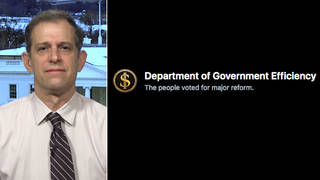
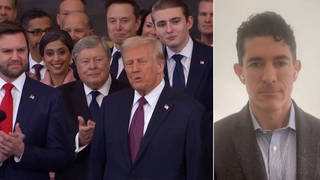
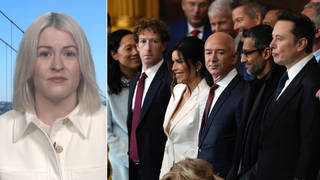





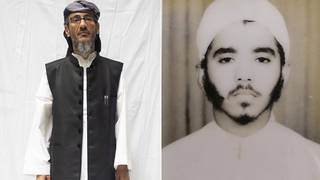
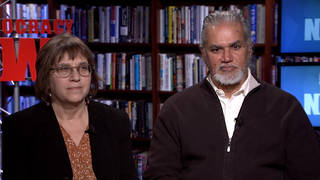
Media Options